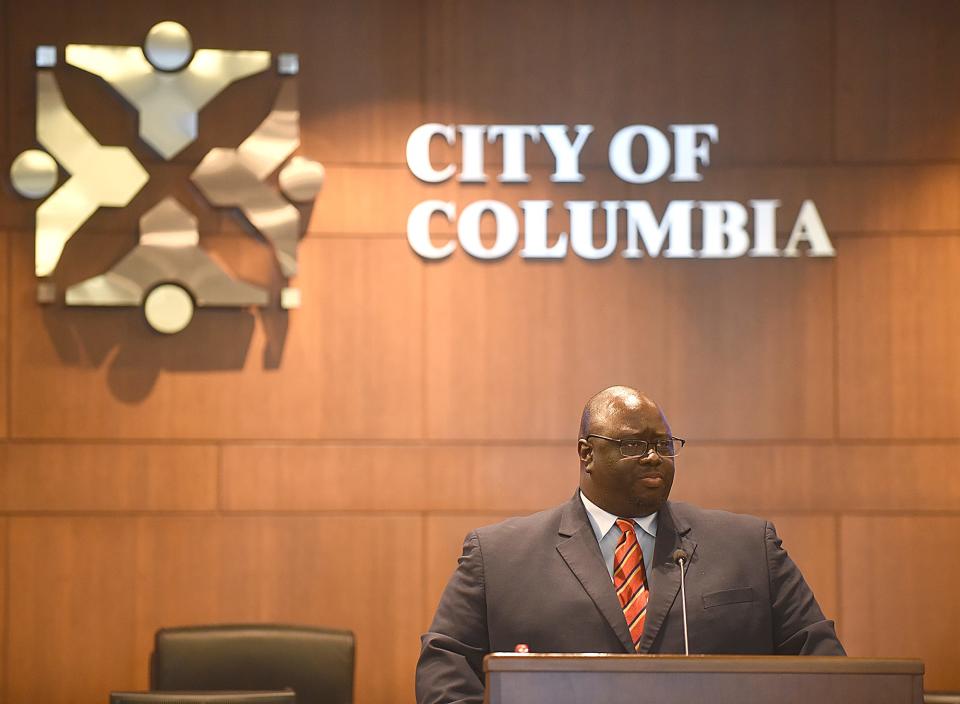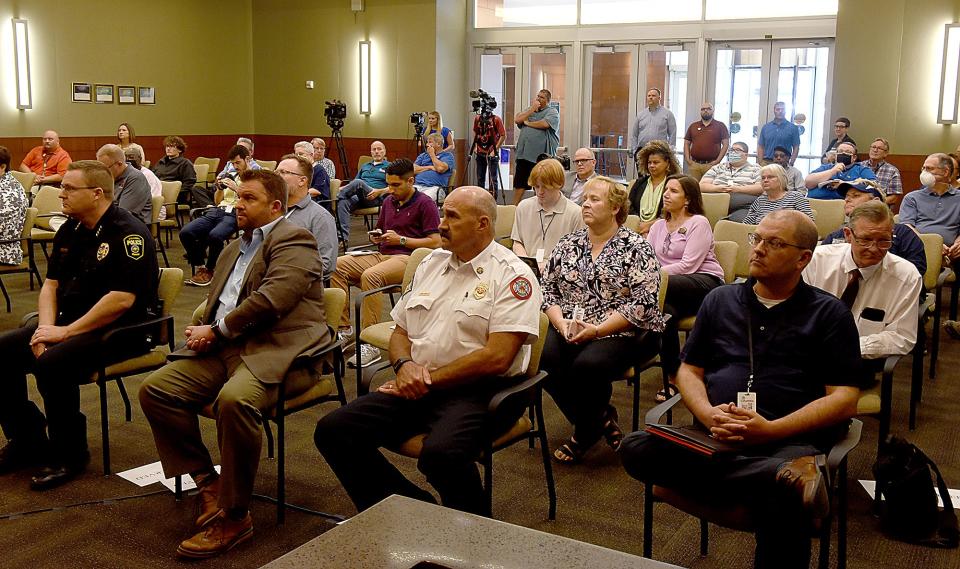Here's what Columbia city manager De'Carlon Seewood prioritized during his first State of the City
Difficulties related to City of Columbia employee retention and compensation were at the forefront of city manager De'Carlon Seewood's first-ever State of the City address Thursday morning at Columbia City Hall.
This focus is needed in light of current and impending vacancies among all city departments, he said.
"The city is behind on providing adequate pay for employees, our most valuable asset," Seewood said.
A comprehensive pay study is underway, Seewood said. The last time the city conducted such a study was nine years ago.
More: New Columbia city manager De'Carlon Seewood focused on engagement with 'informed, active' residents
The city is at a crossroads with employment, based on current vacancies and upward of 380 vacancies expected to come in five years as staff members reach retirement age.
Permanent city employees are receiving a recently approved 3% pay increase this year, and Seewood plans to recommend an additional 4% increase in next year's budget, he said. Employees also received a one-time retention payment for continuing to provide services during the COVID-19 pandemic.
The city is in the process of hiring a new human resources director, fire chief, IT director and public works director. The newly formed office of diversity, equity and inclusion also will need staff leadership.
"I see this as an opportunity to bring in new ideas and new experiences," Seewood said. "This will push us to be better. As we welcome these new faces, I challenge our staff to be open to new ideas and look at new ways of doing things."

Addressing community disparities
COVID-19 highlighted deepening community disparities and issues surrounding Columbia's unsheltered population, Seewood said.
These can be addressed thanks to the city's receipt of American Rescue Plan Act funds, he said.
The city is putting its focus on community violence, homelessness, workforce development and behavioral health for its distribution of the first half of the $25 million it received.
Organizations like The Loop, Moberly Area Community College and Job Point already have received ARPA funds for workforce development from the city.
Partnerships between the Columbia Housing Authority and other agencies are addressing the community's unsheltered population, Seewood said.
More: Council, residents tout need for community outreach in deciding outcome of federal funding
A return to 'normalcy'
Due to the city's response to COVID-19, which was key in having more than 60% of Boone County residents fully vaccinated, community events and engagement are returning to pre-pandemic levels, Seewood said.
This includes events such as Roots N Blues, True/False Film Fest, Unbound Book Festival and Art in the Park.
More: Removal of roll cart ban does not mean imminent change to Columbia's trash collection
"In fiscal year 2021, occupancy rates in our Columbia hotels climbed to 52%, just above 44% from fiscal year 2020," Seewood said.
Event permits jumped to over 50% last year from a low of 15% in 2020.

Budget impacts and priorities
While ARPA funds will be used to improve community issues related to COVID-19, the pandemic still had impacts on the city's general budget.
Next year's budget will factor for inflation and supply-chain issues, despite increases in the community's sales tax, Seewood said. Priorities in the upcoming budget will focus on city employees, social services, public transportation and safety, Seewood said.
More: Columbia organizations tout need for federal Housing and Urban Development funding
The use tax approval in April will let the city hire more police officers and firefighters, among accomplishing other goals, such as sidewalk and street maintenance, he said. The use tax is expected to bring in an additional $5.6 million annually.
At the start of the year, the Columbia Police Department faced a shortage of about 20 officers. The use tax will allow the hiring of around eight more officers, and there are 10 already in a recruitment class going through academy training, Seewood said.
Columbia Police Chief Geoff Jones in May met with Gov. Mike Parson regarding curriculum that could allow high school students to work toward a career in law enforcement.
Columbia/Boone County Department of Public Health and Human Services also is working with Columbia police and fire to improve public trust in these institutions, Seewood said.
"Around half of our officers are working out of the Molly Thomas Bowden precinct every day," he said. "This style of community policing helps officers build relationships with residents."
The city is aligning its budget priorities with the strategic plan approved last July, Seewood said. Part of the strategic plan includes community engagement. While city staff will continue to meet with organizations and individuals, there now is a new tool known as Be Heard CoMo.
"This site allows us to have a central location for project details, where residents can provide feedback and engage with staff from the comfort of their homes or anywhere they have internet access," Seewood said. "Be Heard CoMo is not meant to replace in-person discussions."
The city also continues to publish surveys focused on community input and engagement. Other improvement projects in the city include the new Columbia Regional Airport terminal and McBaine Water Treatment Plant. Further goals include adjusting to a completely electric fleet of city buses.
Parks and Recreation improvements will continue after the recent renewal of the park sales tax. This includes Phase II expansion of the Columbia Sports Fieldhouse.
Affordable housing and increasing the number of minority-owned businesses in the city continue to be top priorities, Seewood said. These can be addressed, in part, through the city's diversity, equity and inclusion office, he added. The city's economic development department also now has a full-time minority business coordinator.
Charles Dunlap covers courts, public safety and other general subjects for the Tribune. You can reach him at cdunlap@columbiatribune.com or @CD_CDT on Twitter. Please consider subscribing to support vital local journalism.
This article originally appeared on Columbia Daily Tribune: Columbia State of the City puts focus on employee retention, pay

